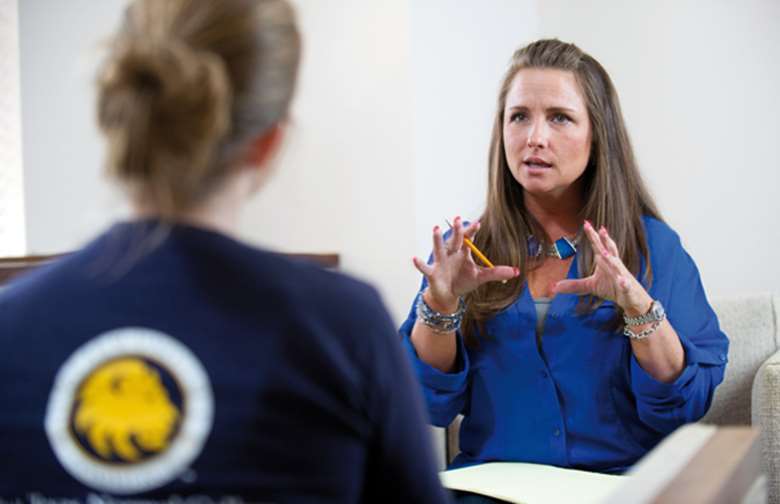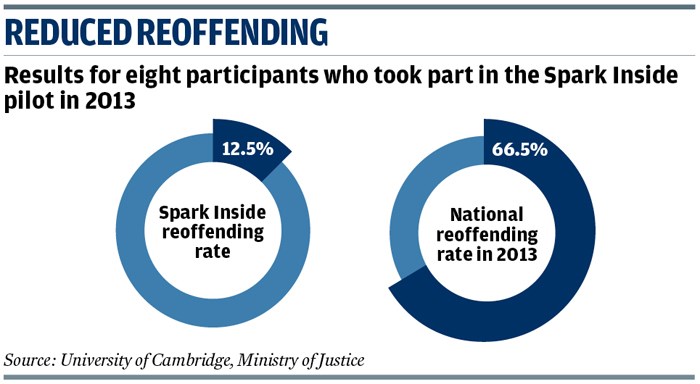How young offenders make better choices thanks to life coaches
Emily Rogers
Tuesday, March 1, 2016
Project helps young people in custody make a fresh start.

Project
Spark Inside
Funding
Income of nearly £400,000 this financial year, mainly from grant funders The Dawes Trust, Esmee Fairbairn Foundation, The Triangle Trust, Stephen Lloyd Awards and St James Place Foundation, as well as commissioners and donors
Background
Spark Inside is a charity working with young offenders. It was set up in 2012 by young social entrepreneur Baillie Aaron after she completed a masters degree in criminological research at the University of Cambridge.
Aaron was keen to improve support for those leaving custody and so interviewed young Londoners who had been in prison and those who'd had friends or relatives in jail to find out what might work. They highlighted the need for tailored, non-curricular support that did not involve being told what to do by others.
In January 2013 the charity launched a 12-month life-coaching pilot involving eight 15- to 18-year-olds in two young offender institutions (YOIs) - Feltham and Cookham Wood in Kent.
Action
The Hero's Journey life coaching programme works with 15- to 25-year-olds. Work with those aged 15 to 18 is commissioned by South London and North East London Resettlement consortia, multi-agency partnerships of youth offending teams, children's services and others aiming to improve outcomes for under-18s emerging from custody.
The consortia refer potential participants to the programme once their release date is between three and six months away. The programme manager meets the young people to see if they are interested in taking part. Prison officers or case workers from other charities in greater London and the South East refer older prisoners aged 18 to 25 to the scheme. Young people can also self-refer or refer prison mates.
The programme starts with The Hero's Journey, an interactive workshop for up to eight young people. It is generally split into three two-hour sessions over three weeks and facilitated by two of the charity's 18 life coaches.
The sessions help participants explore the factors that have shaped their lives, things they would like to change and their goals and ambitions for the future. They are encouraged to confront fears, negative beliefs and obstacles head-on and tap into their strengths. The process is tailored to suit each young person, with coaches helping them identify opportunities ahead as well as develop consequential thinking, the motivation to change and resilience to peer pressure.
Participants are then invited to take part in one-to-one life coaching, starting in custody and continuing after release. Most sessions last an hour. The number and frequency of sessions depend on the needs of the young person.
Spark Inside coaches don't give advice and guidance, but ask open-ended questions, helping clients come up with their own goals and independently develop a workable plan for the future, including moving into employment, education or training. Aaron says the support comes to a "natural" end when both client and coach realise the work is done. "This enables the client to become self-sufficient in a way that moves them firmly away from the criminal justice system," she says.
The programme has supported more than 200 young people and now operates in Medway Secure Training Centre and Pentonville and Wormwood Scrubs prisons, as well as the two pilot YOIs.
Outcome
An independent evaluation of Spark Inside's pilot, by researchers from the University of Cambridge's Institute of Criminology, found just one of the eight participants had been re-convicted a year after release. This was for a minor offence breaching probation conditions. Meanwhile, all eight were actively engaged in, or pursuing, education, employment or training opportunities.
This 12.5 per cent reoffending rate compares to a national rate of 66.5 per cent of under-18s reoffending within 12 months of release from custody in 2013 when the pilot took place. The latest official figures from the Ministry of Justice and Youth Justice Board show this increased to 67.1 per cent in 2014.
If you think your project is worthy of inclusion, email supporting data to derren.hayes@markallengroup.com





